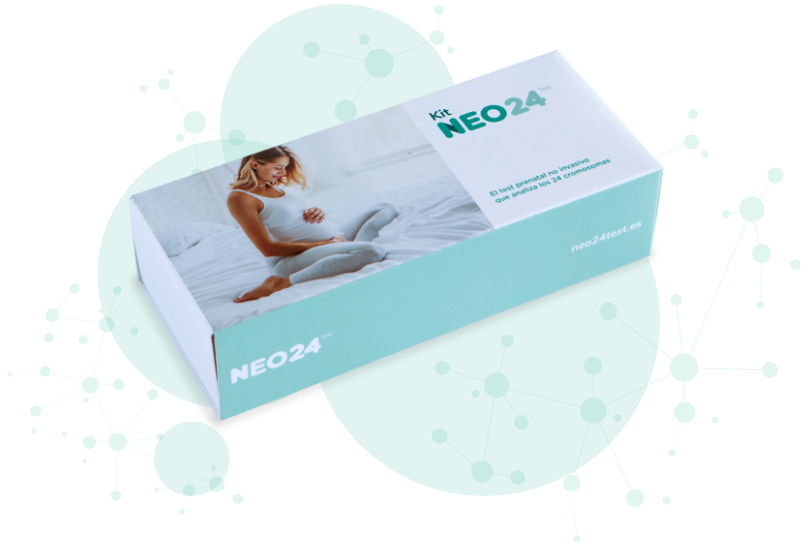Non-invasive prenatal test. We analyze all the 24 chromosomes for the peace of mind of future mothers.
Non-invasive prenatal test.
We analyze all the 24 chromosomes for the peace of mind of future mothers
Neo24 is a non-invasive prenatal test, performed with maternal blood, completely safe for the mother and her unborn child. We analyze the 24 chromosomes for the peace of mind of future mothers.
Enables established pregnancies (from 10 weeks of gestation) to be assessed for certain chromosome abnormalities that can lead to late miscarriages or the birth of a child with serious congenital abnormalities. Neo24 offers a high detection rate for the specific chromosome abnormalities tested and a low false-positive rate. Importantly, the non-invasive nature of the test means that it does not increase the risk of miscarriage unlike traditional invasive prenatal tests.
From week 10 or beyond
Blood sample taken
Sample sent
DNA Test

Report5-7 days

While Neo24 will provide potentially valuable information for any pregnancy, women with the following risk factors should give Neo24 particular consideration:
Testing can take place even in the absence of these risk factors.


Juno Genetics offers a cutting-edge non-invasive prenatal test solution, which examines all 24 types of chromosome. In contrast many other NIPT tests only examine a small number of chromosomes (typically chromosomes 13, 18, 21 and sometimes the sex chromosomes, X and Y). Juno’s Neo24 method is extremely sensitive, delivering one of the highest accuracy rates with the lowest incidence of samples that fail to give a result. The technique used is based upon next-generation sequencing (NGS) technology. A blood sample is taken from the pregnant mother from 10 weeks of gestation. Plasma is isolated from the sample, which contains millions of DNA fragments from the mother and also from the fetus mixed together. These cell-free DNA (cfDNA) fragments are sequenced and a sophisticated analysis is undertaken in order to determine the number of copies of each chromosome.
The analysis reveals the proportion of the cfDNA fragments that come from the fetus and which chromosome each piece of cfDNA originally came from. If an excessive proportion of the cfDNA fragments come from a particular chromosome, this is indicative of the presence of an extra copy of that chromosome. This sort of abnormality, known as ‘trisomy’ is the most common form of aneuploidy seen during pregnancy and explains most miscarriages as well as conditions that can affect liveborn children, such as Down syndrome. Rarer forms of abnormality, such as loss of a chromosomes (monosomy), or abnormalities involving loss or duplication of large pieces of chromosome (>7Mb) can also potentially be detected using the Juno Neo24 test.
Neo24 is a screening test that only look for specific chromosomal abnormalities. This means that other chromosomal abnormalities may be present and could affect the pregnancy. A “No Aneuploidy Detected” result does not guarantee a healthy pregnancy or baby, and does not eliminate the possibility that a fetus may have birth defects, genetic disorders, or other conditions, such as open neural tube defects or autism. There is a small possibility that the test results might only reflect the chromosomes of the placenta and not those of the fetus (this is known as confined placental mosaicism, CPM).
Additionally, the results of the test may be confused if some of the cells of the mother have an abnormal number of chromosomes. In the case of a twin pregnancy, the presence or absence of Y chromosome material can be reported, but it will not be clear whether both twins are male or just one of them. Furthermore, abnormalities affecting the sex chromosomes cannot be evaluated in twin pregnancies.
Because of the limitations outlined above, no irreversible clinical decisions should be made based on Neo24 results alone. If a definitive diagnosis is desired, chorionic villus sampling or amniocentesis would be necessary.
Yes. This test is for all pregnant women, whether they conceived using assisted reproduction treatment or naturally.
It does not replace them, because they are different types of test. In general terms, the Neo24 test is a screening test for patients with no previous abnormal findings related to their pregnancy. It is a non-invasive test, where neither the baby nor the placenta are sampled directly. In contrast, amniocentesis and chorionic villus sampling (CVS) are invasive, the former involves piercing the amniotic sac and removing a small sample of amniotic fluid containing foetal cells, while the latter removes cells from the placenta, which have associated risks for the pregnancy. The Neo24 test detects abnormalities in the number of chromosomes, not in their structure, whereas with amniocentesis and CVS a complete karyotype is obtained. Amniocentesis and CVS are used when a definitive result is necessary – for example, if an abnormality has been detected using a non-invasive test, or if abnormalities have been observed during an ultrasound examination. On the other hand, the Neo24 test can be performed from week 10, whereas for amniocentesis it is usual to wait until at least week 14 and CVS is not usually undertaken before week 11. In any case, your doctor will be able to explain which test is most appropriate in your case.
Yes, the test can be performed for twin pregnancies, although in such cases it is not always possible to detect abnormalities affecting the X and Y chromosomes.
